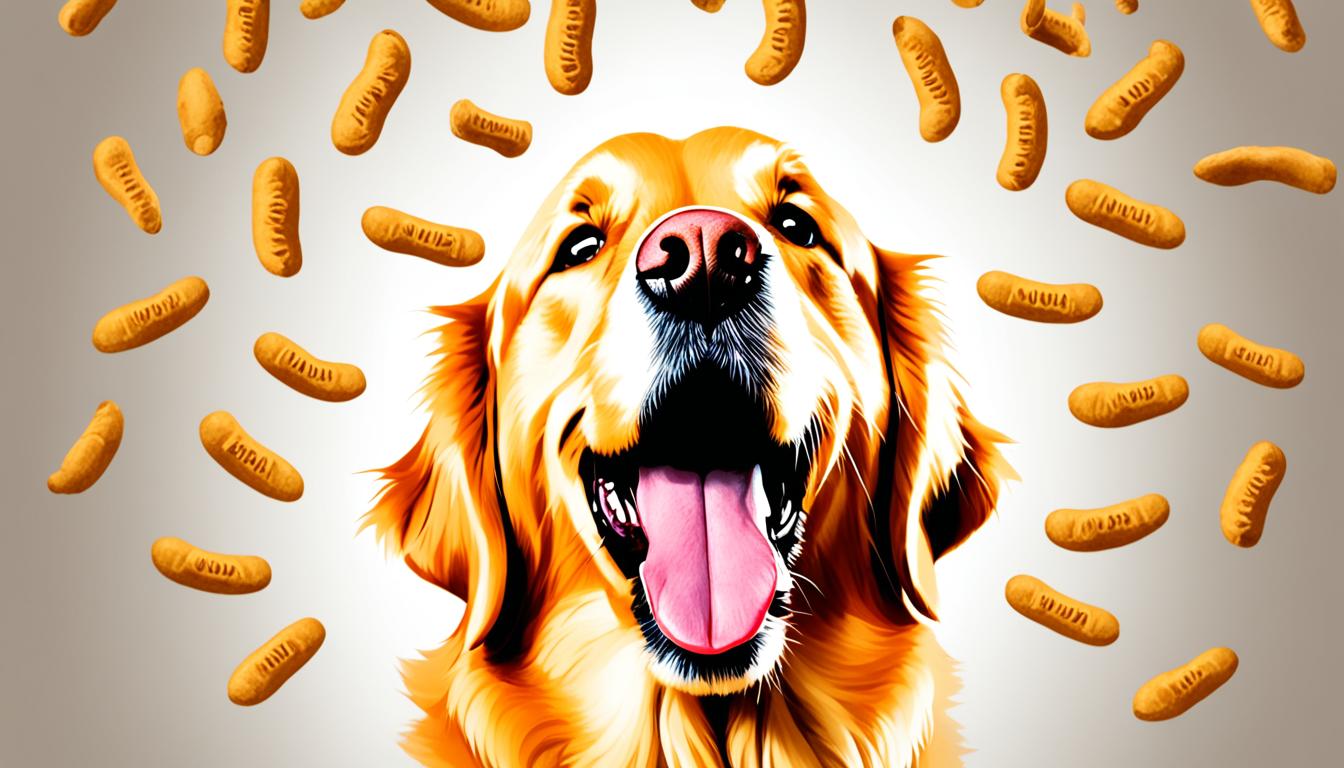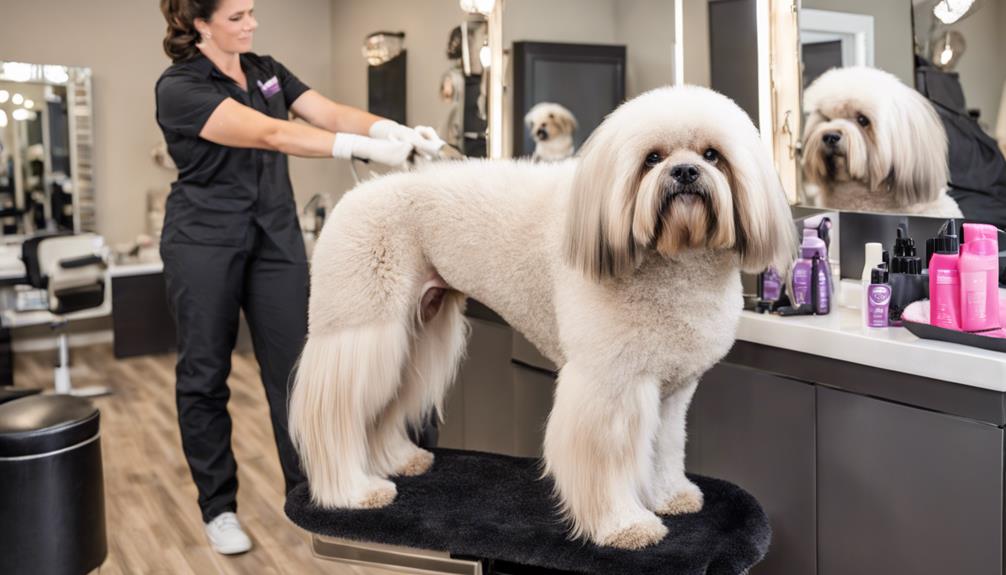Are you aware that many dog owners give peanuts to their furry friends as a snack? Even though peanuts may appear to be harmless, it is crucial to determine whether they are safe for dogs or if they present any potential risks. This article will explore this topic in order to assist you in making well-informed decisions regarding feeding peanuts to your four-legged companion.
Key Takeaways:
- Peanuts can provide valuable nutrients to dogs, but they should only make up a small portion of their daily caloric intake.
- Allergies to peanuts can occur in dogs and may present with symptoms such as trouble breathing and swelling.
- The high fat content in peanuts can lead to digestion problems and pancreatitis in dogs.
- Choose unsalted peanuts or roasted peanuts without any added flavorings when feeding them to your dog.
- Some peanut butter brands may contain xylitol, a sweetener that is highly toxic to dogs. Always check the ingredients before giving your dog peanut butter.
The Nutritional Value of Peanuts for Dogs
Peanuts offer a host of nutritional benefits for dogs, packed with essential vitamins and minerals that contribute to their overall health and well-being. These nutrient-rich legumes can provide a valuable addition to your furry friend’s diet when given in moderation.
When it comes to vitamins, peanuts contain a good amount of vitamin B6, which aids in healthy brain development and promotes a strong immune system. Vitamin E is also present, serving as a potent antioxidant that helps protect cells from damage caused by free radicals.
Minerals found in peanuts, such as phosphorus, potassium, and niacin, further enhance the nutritional profile. Phosphorus supports healthy bones and teeth, while potassium helps maintain proper muscle function and nerve communication. Niacin, on the other hand, plays a critical role in energy production and cell metabolism.
It is important to note that while peanuts are beneficial for dogs, they should only make up a small portion of their daily caloric intake. Typically, peanuts should account for no more than 10% of a dog’s daily diet to prevent overconsumption and maintain a balanced nutritional intake.
Incorporating peanuts into your dog’s diet can be a nutritious way to provide them with essential vitamins and minerals. However, it’s always wise to consult with your veterinarian before making any significant changes to your furry friend’s dietary routine.
Summary: Nutritional Benefits of Peanuts for Dogs
To summarize, peanuts offer the following nutritional benefits for dogs:
- Valuable vitamins, including vitamin B6, which supports brain development, and vitamin E, an antioxidant that protects cells.
- Essential minerals such as phosphorus, potassium, and niacin that contribute to bone health, muscle function, and energy production.
- Peanuts should be given in moderation and make up no more than 10% of a dog’s daily caloric intake.
By incorporating peanuts into your dog’s diet responsibly, you can provide them with a wholesome snack that contributes to their overall well-being and nutritional needs.
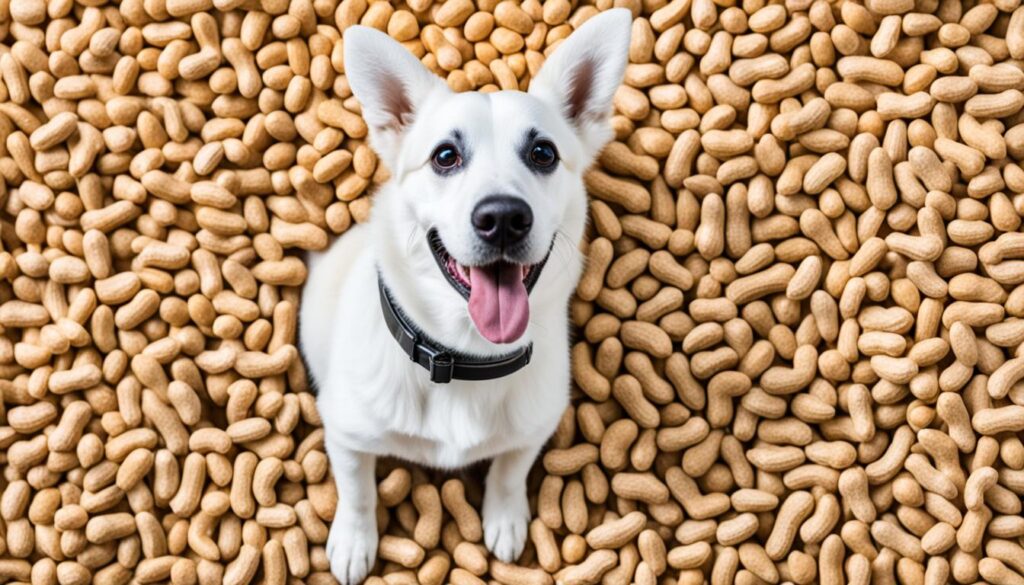
Potential Risks of Feeding Peanuts to Dogs
While peanuts can offer nutritional benefits, they also come with potential risks for dogs. It’s important for dog owners to be aware of these risks to ensure the well-being of their furry friends.
Allergic Reactions: Peanut Allergy in Dogs
Just like humans, dogs can develop allergies to peanuts. An allergic reaction to peanuts can range from mild symptoms, such as itching or skin irritation, to more severe reactions, including difficulty breathing, swelling, or even anaphylaxis. If your dog shows any signs of an allergic reaction after consuming peanuts, it’s vital to seek immediate veterinary assistance. Avoid feeding peanuts to dogs known to have a peanut allergy.
Digestion Problems: Digestion Problems from Peanuts in Dogs
The high fat content in peanuts can pose digestion problems for dogs. Consuming large amounts of peanuts or peanut butter can lead to gastrointestinal issues such as stomach upset, diarrhea, or vomiting. Dogs with sensitive stomachs or those prone to digestive problems should be given peanuts in limited quantities or avoid them altogether.
Pancreatitis: Pancreatitis in Dogs
The rich fat content in peanuts can also increase the risk of pancreatitis in dogs. Pancreatitis is a painful condition characterized by inflammation of the pancreas. Symptoms of pancreatitis in dogs may include loss of appetite, abdominal pain, vomiting, and diarrhea. If you suspect your dog has pancreatitis, prompt veterinary care is essential to prevent complications and ensure a speedy recovery.
It’s crucial to monitor your dog’s response to peanuts and consult with a veterinarian if you have any concerns. Every dog is unique, and what may be safe for one dog may not be suitable for another. Understanding and managing the potential risks associated with feeding peanuts to dogs is vital to keep them safe and healthy.
Choosing the Right Peanuts for Dogs
When it comes to feeding peanuts to dogs, it’s important to choose the right type. Different varieties of peanuts can have different effects on a dog’s health. Here’s a guide to selecting the best peanuts for your furry friend:
Unsalted Peanuts for Dogs
Unsalted peanuts are the safest option when it comes to feeding dogs. Excessive sodium can be harmful to dogs and can lead to various health issues. By opting for unsalted peanuts, you can eliminate the risk of sodium overload in your dog’s diet.
Boiled Peanuts for Dogs
In some regions, boiled peanuts are a popular snack. If you want to share this treat with your dog, it’s essential to ensure that the peanuts are unsalted and unseasoned. Dogs can enjoy boiled peanuts in small quantities, as long as they are free from any additional flavors or spices.
Roasted Peanuts for Dogs
Roasted peanuts are generally safe for dogs. However, it’s important to choose plain roasted peanuts without any added flavors or seasonings. Flavored varieties like honey-roasted or spiced peanuts should be avoided as they often contain ingredients that may be harmful to dogs.
| Type of Peanuts | Safety for Dogs | Precautions |
|---|---|---|
| Unsalted Peanuts | Safe | Ensure absence of added salt |
| Boiled Peanuts | Safe in moderation | Choose unsalted and unseasoned peanuts |
| Roasted Peanuts | Safe in moderation | Avoid flavored or seasoned varieties |
It’s crucial to remove the shells from peanuts before feeding them to your dog. The shells can pose a choking hazard and should not be ingested. By following these guidelines and making informed choices, you can ensure that your dog enjoys the benefits of peanuts without any potential risks.
Peanut Butter for Dogs
Peanut butter is undoubtedly a favorite treat among canines, providing a tasty and satisfying indulgence. However, not all peanut butter is safe for our furry friends. When selecting peanut butter for your dog, it’s essential to consider their health and ensure that the product is suitable for their consumption.
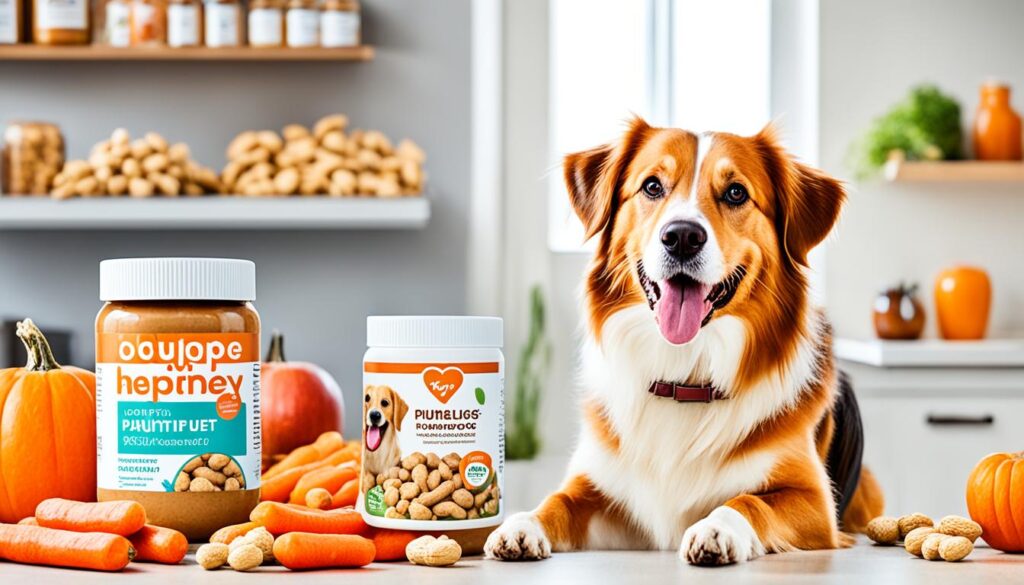
The Importance of Choosing the Right Peanut Butter
While peanut butter can be a nutritious addition to a dog’s diet, it’s crucial to opt for safe options and avoid potential risks. Here are some key considerations:
- Check for Unsalted Peanut Butter: Excessive sodium consumption can be harmful to dogs. Therefore, it’s recommended to choose unsalted peanut butter to control their salt intake.
- Avoid Added Sugars: Sugar-free peanut butter is a prudent choice to prevent the potential dangers of added sugars in a dog’s diet. Too much sugar can contribute to obesity, diabetes, and dental problems in dogs.
- Be Wary of Xylitol: Some peanut butter products may contain xylitol, a sweetener that is highly toxic to dogs. Xylitol ingestion can lead to a severe drop in blood sugar levels, liver failure, and even death. Carefully read the ingredient list and avoid peanut butter that contains xylitol.
Homemade Peanut Butter for Dogs
For those who prefer a more hands-on approach, making homemade peanut butter can provide peace of mind, knowing exactly what goes into the treat. Here’s a simple recipe:
“Homemade Peanut Butter Recipe”
- Ingredients:
- 2 cups unsalted peanuts
- Instructions:
- 1. Preheat oven to 350°F (175°C).
- 2. Spread the peanuts on a baking sheet in a single layer.
- 3. Roast the peanuts in the oven for 10-15 minutes, or until golden brown.
- 4. Remove the peanuts from the oven and let them cool.
- 5. Place the cooled peanuts in a food processor or blender.
- 6. Pulse the peanuts until they reach a smooth and creamy consistency, scraping down the sides as needed.
- 7. Transfer the homemade peanut butter to a jar and store it in the refrigerator.
Summary
When it comes to peanut butter for dogs, it’s crucial to prioritize their safety and well-being. Opting for unsalted and sugar-free peanut butter while avoiding xylitol-containing products can help ensure their health. If in doubt, consult with a veterinarian to determine the best options for your canine companion’s dietary needs.
Peanut Butter and Jelly for Dogs
While peanut butter is generally safe for dogs, it’s important to exercise caution when it comes to peanut butter and jelly sandwiches. Can dogs eat peanut butter and jelly? Let’s find out.
Grapes, including grape jelly, are toxic to dogs and should be avoided. The risks of grape jelly for dogs can be severe, leading to kidney failure and other serious health issues. It’s best to keep grapes and grape products, including jelly, away from your canine companion’s diet.
Besides the dangers of grapes, some jellies may contain xylitol as a sweetener. Xylitol is highly dangerous for dogs and can cause a sudden drop in blood sugar levels, leading to seizures, liver damage, and even death. Therefore, it is crucial to read the labels carefully before giving your dog any jelly products.
To ensure the safety of your furry friend, it’s best to stick to plain peanut butter without any jelly. Homemade peanut butter, without additives or sweeteners, is usually the safest option. Remember to always consult your veterinarian for guidance regarding your dog’s specific dietary needs.
The Risks of Grape Jelly for Dogs:
“Grapes and grape products, including grape jelly, are toxic to dogs and can lead to kidney failure. It’s crucial to keep these foods away from your four-legged companion’s reach.”
– Dr. Jane Peterson, Veterinarian
Can Dogs Eat Peanut Butter and Jelly?
| Peanut Butter | Jelly | Safe for Dogs |
|---|---|---|
| Plain peanut butter without additives | Avoid grape jelly | Yes |
| Peanut butter with xylitol | Jelly products containing xylitol | No |
When offering peanut butter to your furry friend, it’s essential to ensure it is free from harmful ingredients like xylitol and grapes. Remember, the safety and well-being of your dog should always be a top priority.
Image:
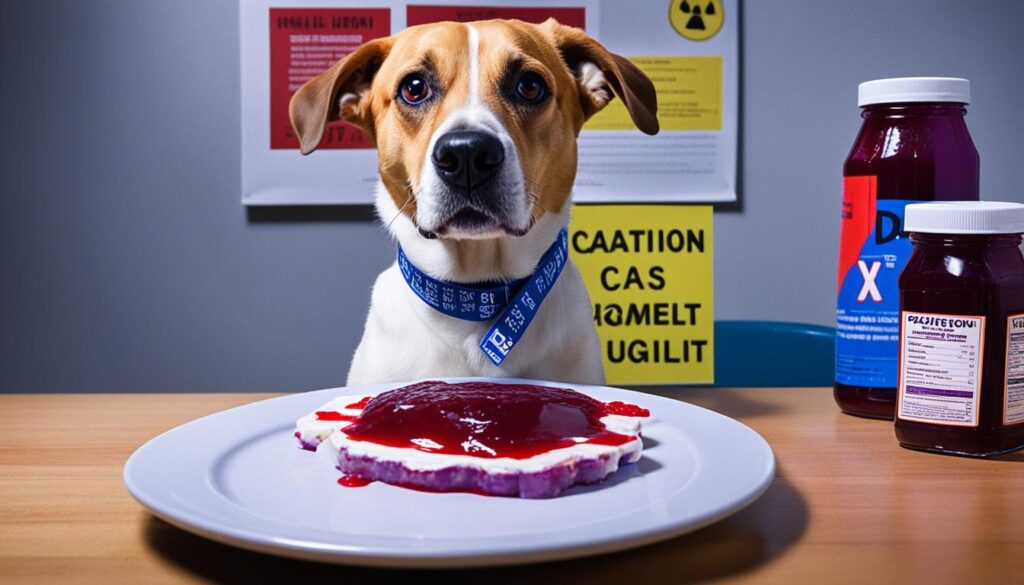
Moderation and Other Considerations
Moderation is key when it comes to feeding peanuts to dogs. While peanuts can provide valuable nutrients, it’s important to remember that they should only be given in moderate amounts. Feeding only a few peanuts occasionally and avoiding excessive intake is crucial to prevent any potential health issues that may arise from overconsumption.
It’s worth noting that dogs with certain health conditions should avoid peanuts altogether. Dogs with heart disease, kidney issues, or those on specific diets may be more susceptible to adverse effects from peanuts. It’s always best to consult with a veterinarian before incorporating peanuts into the diet of a dog with these health concerns.
Homemade Treats for Dogs
If you prefer to make treats for your dog, homemade options can be a great choice. Homemade treats allow you to have control over the ingredients and eliminate any potential health risks associated with store-bought treats.
When making homemade treats, consider using peanut butter flavored treats with moderate peanut content. This way, you can still incorporate the flavor of peanuts without the risk of overconsumption. Additionally, you can explore other healthy ingredients to include in the treats, such as carrots, pumpkin, or apples.
“Homemade treats provide a wonderful opportunity to bond with your furry friend and ensure they’re getting wholesome, nutritious snacks.”
Remember to choose recipes that are suitable for your dog’s specific dietary needs and preferences. It’s also important to avoid using any harmful ingredients, such as chocolate or xylitol, which can be toxic to dogs.
By taking a mindful approach to peanut intake and opting for homemade treats, you can ensure that your dog enjoys safe and wholesome snacks.
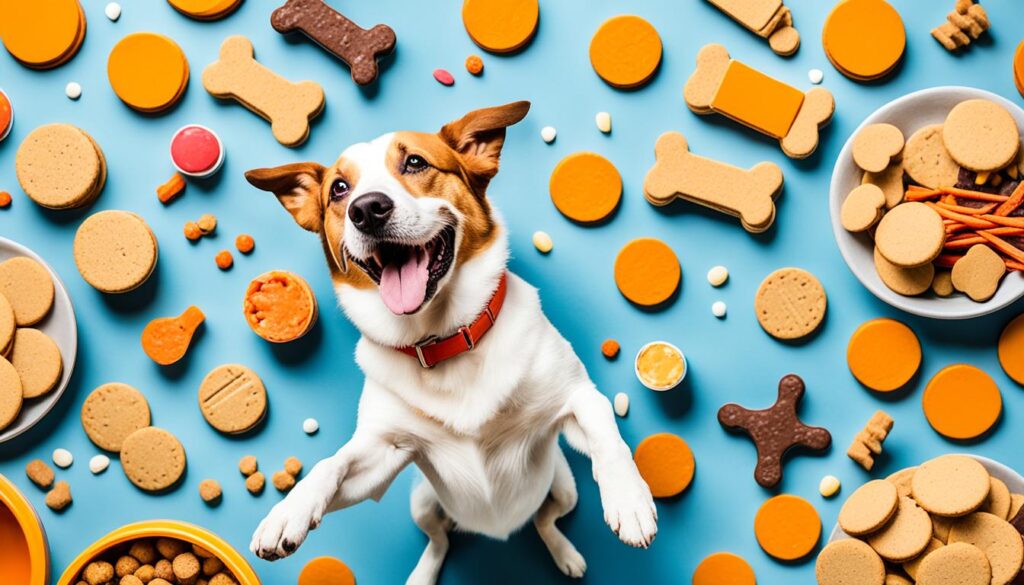
| Treat Name | Ingredients | Instructions |
|---|---|---|
| Peanut Butter Pumpkin Treats | Peanut butter, canned pumpkin, whole wheat flour, eggs | 1. Preheat oven to 350°F. 2. In a bowl, mix together peanut butter, canned pumpkin, whole wheat flour, and eggs until well combined. 3. Roll the dough into small balls and place them on a lined baking sheet. 4. Using a fork, press down on each ball to create a crisscross pattern. 5. Bake for 15-20 minutes or until the treats are golden brown. 6. Allow the treats to cool before serving to your dog. |
| Carrot Peanut Butter Bites | Carrots, peanut butter, oats, honey | 1. Grate the carrots using a box grater. 2. In a bowl, mix together grated carrots, peanut butter, oats, and honey until well combined. 3. Roll the mixture into bite-sized balls and place them on a lined baking sheet. 4. Flatten each ball using the back of a spoon. 5. Bake for 10-12 minutes or until the treats are firm. 6. Allow the treats to cool completely before serving to your dog. |
Potential Hazards of Peanuts and Nuts for Dogs
While peanuts can be safe for dogs, it’s important to be aware of the potential hazards that other nuts can pose. Some nuts can present choking hazards or even toxicity risks for our canine companions.
Choking Hazards of Nuts for Dogs
Almonds, macadamia nuts, and pecans are examples of nuts that can be potential choking hazards for dogs. Their size, shape, or hard texture can make it difficult for dogs to chew and swallow them safely. It’s crucial to prevent dogs from accessing these nuts to avoid any choking incidents.
Toxic Nuts for Dogs
When it comes to nut toxicity for dogs, macadamia nuts deserve special attention. They are known to be poisonous to dogs and can cause various symptoms when ingested. These symptoms may include vomiting, lethargy, weakness, loss of balance, and even tremors or seizures. If you suspect your dog has consumed macadamia nuts, it’s essential to seek immediate veterinary care.
Symptoms of Nut Toxicity in Dogs
The symptoms of nut toxicity in dogs may vary depending on the specific type of nuts involved. Common symptoms can include gastrointestinal issues such as vomiting or diarrhea. In more severe cases, dogs may exhibit signs of pancreatitis, which can cause abdominal pain, decreased appetite, and lethargy. If you notice any abnormalities in your dog’s behavior or health after they have potentially ingested nuts, it’s best to consult with a veterinarian for proper diagnosis and treatment.
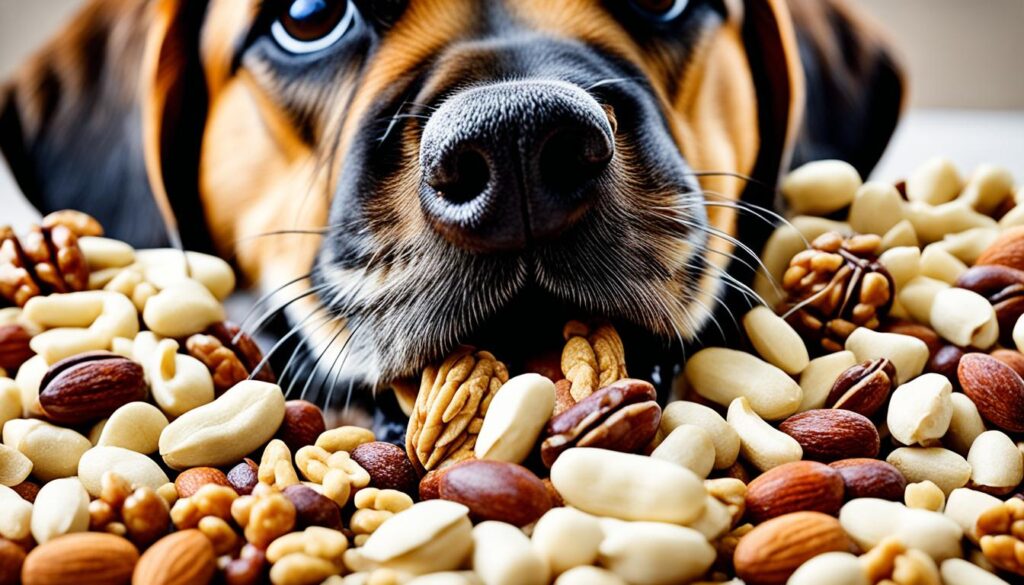
| Nut Type | Potential Hazards |
|---|---|
| Almonds | Potential choking hazards |
| Macadamia nuts | Choking hazards and toxic to dogs. Symptoms may include vomiting, weakness, and loss of balance. |
| Pecans | Potential choking hazards |
Signs of Peanut Allergy or Toxicity in Dogs
As a responsible dog owner, it’s crucial to be able to recognize the signs of peanut allergy or toxicity in your furry friend. Peanuts, although enjoyed by many dogs, can sometimes trigger allergic reactions or pose toxicity risks. By being aware of the symptoms, you can take prompt action and ensure the well-being of your canine companion.
Allergic Reactions
- Trouble breathing: Watch for signs of wheezing, coughing, or labored breathing. These could indicate an allergic reaction to peanuts.
- Swelling: Pay attention to any swelling, particularly around the face, lips, or throat. This can be a sign of an allergic response to peanuts.
- Skin reactions: Keep an eye out for itching, hives, or redness on your dog’s skin. These symptoms may also indicate a peanut allergy.
Peanut Toxicity
- Digestive issues: Vomiting, diarrhea, or abdominal discomfort can be signs of peanut toxicity in dogs. If you notice these symptoms after your dog consumes peanuts, it’s important to consult a veterinarian.
- Pancreatitis: In severe cases, excessive consumption of peanuts can lead to pancreatitis, which involves inflammation of the pancreas. Common symptoms include abdominal pain, lethargy, and loss of appetite.
- Xylitol poisoning: While not directly related to peanuts, it’s essential to be cautious when feeding peanut butter that may contain xylitol. Xylitol is a sweetener that is highly toxic to dogs. Symptoms of xylitol poisoning include vomiting, loss of coordination, and seizures.
If you observe any of these signs or suspect that your dog may have an allergy or toxicity related to peanuts, it’s crucial to seek veterinary care immediately. A professional evaluation and appropriate treatment can help ensure the well-being and safety of your beloved pet.

Safe Nut Alternatives for Dogs
If you’re looking for safe nut alternatives for your dog, there are several options available. Dogs can still enjoy tasty treats without the risk associated with certain nuts. Here are some alternatives to consider:
Plain Hazelnuts
Hazelnuts can be a delicious and safe nut option for dogs when given in moderation. They offer a satisfying crunch and are packed with nutrients that can benefit canine health. Just be sure to provide plain hazelnuts without any seasonings or added salt.
Roasted and Shelled Cashews
Cashews can be a nutty and nutritious alternative for dogs. They are low in cholesterol and provide essential minerals like magnesium and phosphorus. Keep in mind that cashews should be roasted and shelled to avoid any potential choking hazards.
Pine Nuts
Pine nuts can be a tasty treat for dogs when included in their diet in moderation. These small nuts have a delicate flavor and are a good source of beneficial fatty acids, vitamins, and minerals. Just remember to offer plain pine nuts without any added seasonings or spices.
Before introducing any new food to your dog’s diet, it’s always best to consult with your veterinarian. They can provide specific guidance based on your dog’s individual needs and any underlying health conditions.
If you prefer to explore ready-made options, there are also many nut-free dog treats available on the market. These treats provide a safe and delicious alternative to nuts while still satisfying your dog’s cravings for tasty snacks. Look for reputable brands that prioritize quality ingredients and meet the nutritional needs of your furry friend.
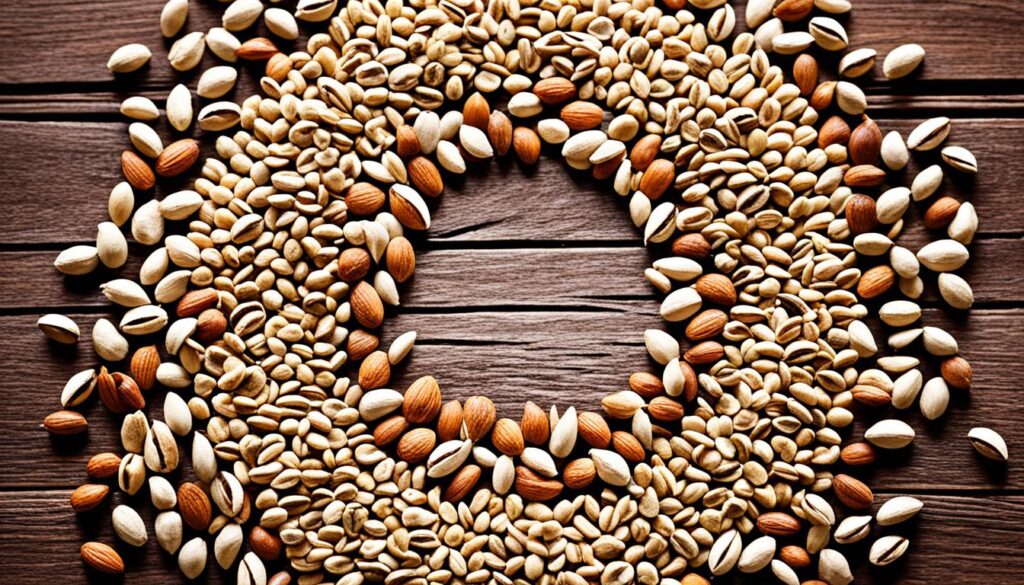
“Dogs can still enjoy tasty treats without the risk associated with certain nuts.”
Conclusion
In conclusion, the safety of peanuts for dogs depends on various factors. While peanuts can be a tasty and nutritious treat when given in moderation, it’s important to consider the potential risks they may pose to your furry friend.
Feeding unsalted, plain peanuts to dogs in small quantities is generally safe. However, it’s crucial to be cautious of potential digestive problems, pancreatitis, and allergic reactions that can arise from peanut consumption. Dogs with certain health conditions or those on specific diets should avoid peanuts altogether.
Consulting with a veterinarian can provide valuable guidance on whether peanuts are suitable for your dog’s individual needs. Additionally, practicing moderation and always prioritizing your dog’s health and well-being when offering treats is paramount.
Remember, there are alternative nut-free treats available on the market that can provide a safe and delicious option for your dog. By considering their dietary requirements and consulting with professionals, you can ensure your furry companion enjoys a healthy and balanced diet.
